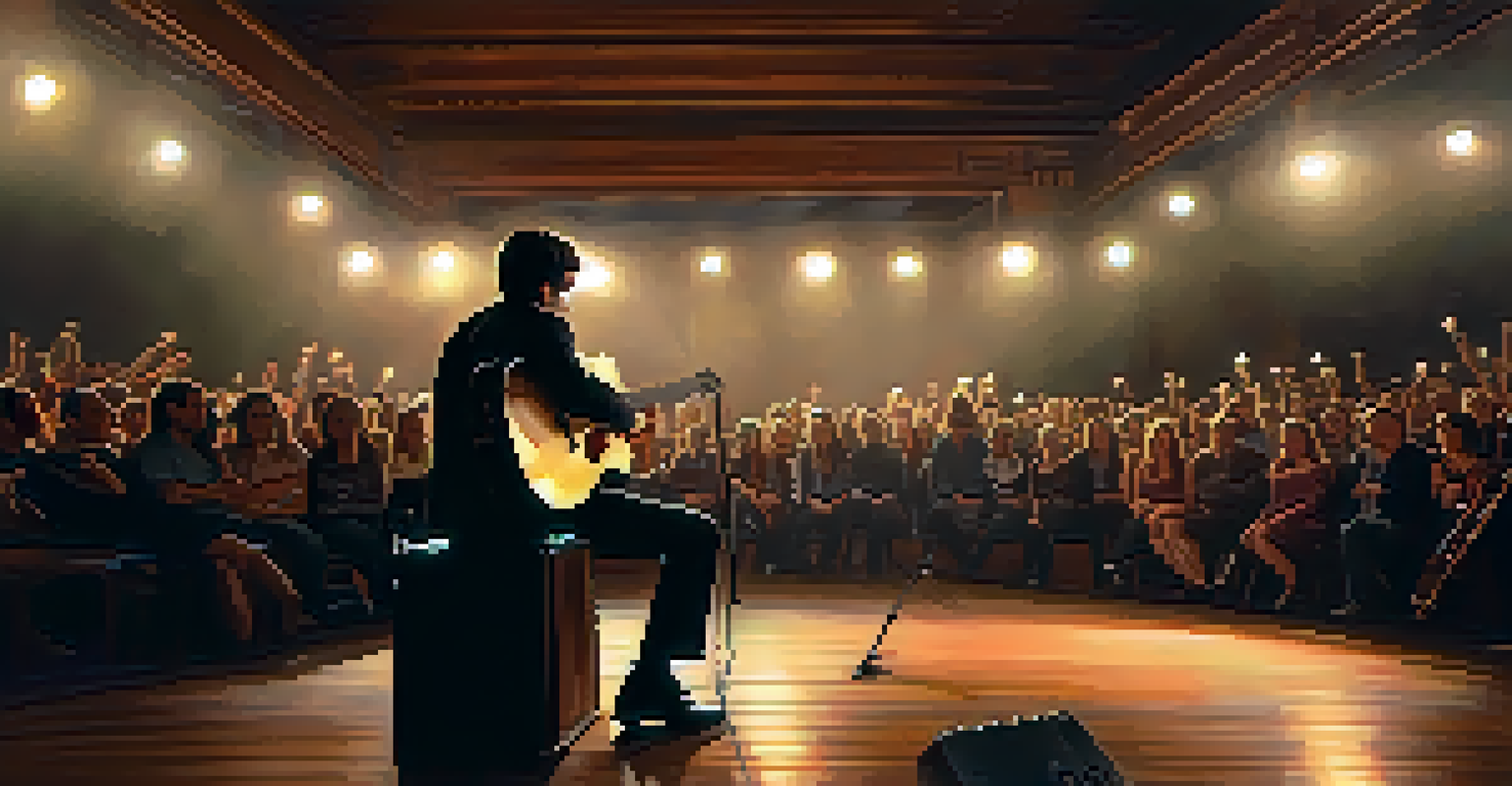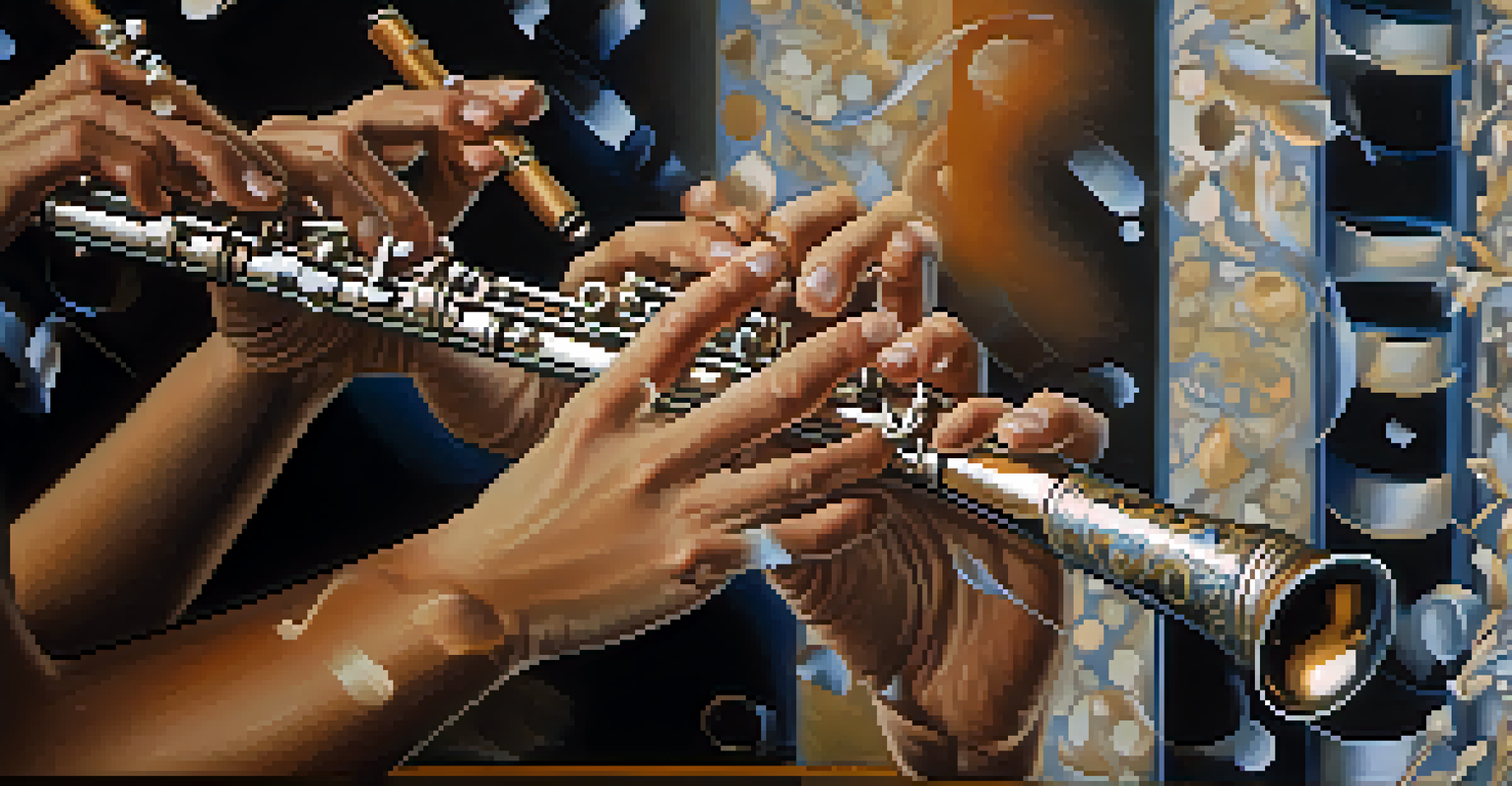The Impact of Performance Anxiety on Musical Creativity

Understanding Performance Anxiety in Musicians
Performance anxiety, often described as stage fright, is a common experience for musicians. It can manifest as physical symptoms like trembling hands or a racing heart, and emotional responses like fear of judgment. This anxiety can strike before, during, or after a performance, making it a pervasive challenge for many artists.
The more we try to control our performance, the more we lose our ability to be spontaneous and creative.
Many musicians feel the pressure to deliver flawless performances, which can exacerbate feelings of anxiety. When faced with an audience, the stakes seem higher, leading to self-doubt and worry about disappointing fans or critics. This fear can overshadow the joy of making music, turning a passion into a source of stress.
Understanding the roots of performance anxiety is crucial for musicians. It often stems from personal experiences, perfectionist tendencies, or past negative performances. By acknowledging these triggers, musicians can start to address their anxiety and reclaim their creative expression.
The Role of Creativity in Music Performance
Creativity is the heartbeat of music, allowing artists to express emotions and tell stories. It involves improvisation, experimentation, and the willingness to take risks. However, performance anxiety can stifle this creativity, making it challenging for musicians to connect with their artistic instincts.

When anxiety takes center stage, musicians may find themselves adhering strictly to their prepared notes, fearing that deviation could lead to mistakes. This restriction can dull their unique sound and limit their ability to engage with their audience. Instead of allowing the music to flow, they may become trapped in a cycle of self-criticism.
Performance Anxiety is Common
Many musicians experience performance anxiety, which can hinder their ability to enjoy and express their music.
To foster creativity, musicians must find ways to manage and reduce performance anxiety. Techniques such as mindfulness, deep breathing, and visualization can help create a more relaxed state of mind, paving the way for greater artistic freedom during performances.
How Anxiety Affects Musical Expression
Musical expression relies heavily on the ability to convey emotions authentically. Performance anxiety can create a barrier that prevents musicians from fully expressing themselves, resulting in a lackluster performance. This can lead to a disconnect between the artist and their audience, diminishing the overall experience.
Vulnerability is the birthplace of innovation, creativity, and change.
When anxiety clouds their mind, musicians may struggle to connect with the emotions they wish to portray. For example, a classical pianist may feel so overwhelmed that they play mechanically, losing the emotive nuances that make a piece resonate. This denies both the artist and the audience the rich experience that live music can offer.
Finding a balance between managing anxiety and embracing creativity is essential. A supportive environment, whether through fellow musicians or understanding audiences, can help artists reclaim their emotional expression and enhance their performances.
The Paradox of Performance Anxiety and Success
Interestingly, some musicians find that a certain level of anxiety can actually enhance their performance. This paradox suggests that while excessive anxiety is detrimental, a small amount can serve as a motivator, pushing artists to prepare more thoroughly and elevate their game.
Many successful musicians have shared stories of using their anxiety to fuel their artistry, transforming nerves into energy. This shift in perspective can lead to a more dynamic performance, as artists channel their anxiety into passion and intensity on stage. The key is learning to harness that energy without letting it spiral out of control.
Creativity Thrives with Management
Managing performance anxiety through techniques like mindfulness can help musicians reconnect with their creative instincts.
Ultimately, each musician must navigate their own relationship with anxiety and success. By reframing their mindset around performance anxiety, they can discover an unexpected ally in their artistic journey.
Coping Strategies for Musicians Facing Anxiety
Musicians can benefit from a variety of coping strategies to manage performance anxiety effectively. Techniques such as systematic desensitization, where musicians gradually expose themselves to performance situations, can help reduce fear over time. This approach allows them to build confidence and familiarity with the performance environment.
Another effective strategy is the practice of mindfulness and meditation. By focusing on the present moment and letting go of worries about the future, musicians can create a sense of calm before taking the stage. Incorporating breathing exercises into their routine can also help ground them and reduce physical symptoms of anxiety.
Lastly, seeking support from fellow musicians or mental health professionals can provide valuable insights and encouragement. Sharing experiences and coping strategies with others can create a sense of community, reminding artists that they are not alone in their struggles.
The Influence of Audience on Performance Anxiety
The presence of an audience can significantly impact a musician's performance anxiety. For some, an audience acts as a source of motivation, while for others, it heightens feelings of self-consciousness. Understanding the audience's role is crucial in managing performance anxiety effectively.
Musicians often worry about how their performance will be received, leading to excessive focus on external validation. This preoccupation can detract from their ability to enjoy the act of performing and may result in a less authentic expression of their artistry. It's essential for musicians to shift their focus from the audience's judgment to their own artistic intentions.
Vulnerability Leads to Growth
Embracing vulnerability allows musicians to foster deeper connections with their audience and reclaim their passion for music.
Creating a supportive audience environment can also alleviate performance anxiety. Engaged and encouraging listeners can foster a sense of connection, allowing musicians to feel more at ease and free to express themselves fully.
Embracing Vulnerability as a Path to Growth
Embracing vulnerability can be a transformative approach for musicians dealing with performance anxiety. Acknowledging their fears and imperfections can lead to genuine growth and self-discovery. By allowing themselves to be vulnerable, artists can break through the barriers that anxiety creates.
This acceptance fosters a deeper connection with their audience, as vulnerability often resonates on a human level. When musicians share their authentic selves, they invite listeners into their world, creating a more intimate and impactful experience. This approach can lead to a more rewarding performance for both the artist and the audience.

Ultimately, embracing vulnerability allows musicians to reclaim their creativity and passion for music. By viewing performance anxiety as a part of their journey rather than a hindrance, they can continue to evolve as artists and connect more deeply with their craft.